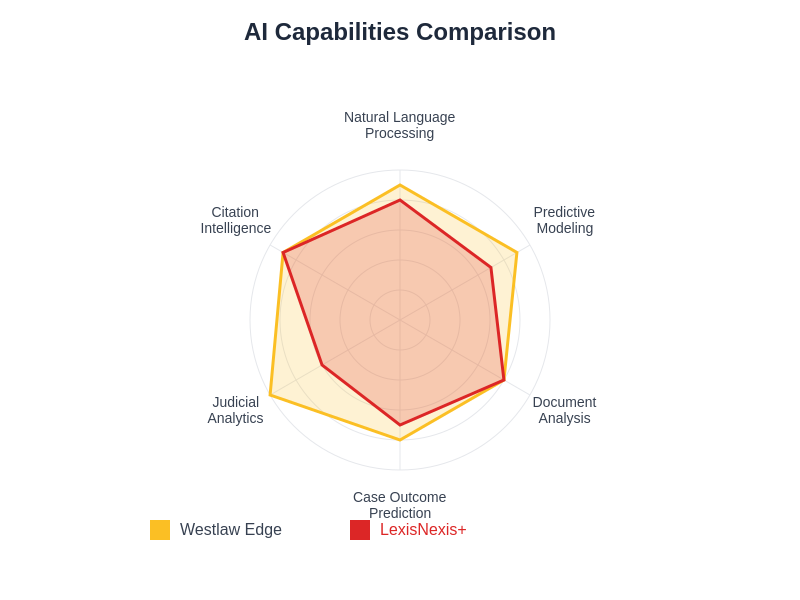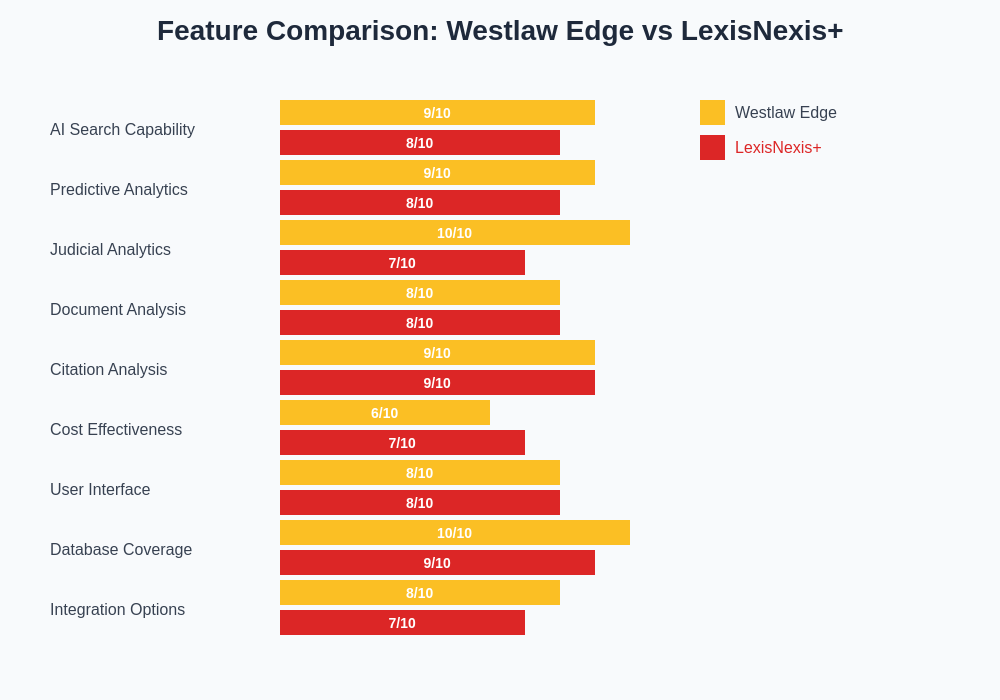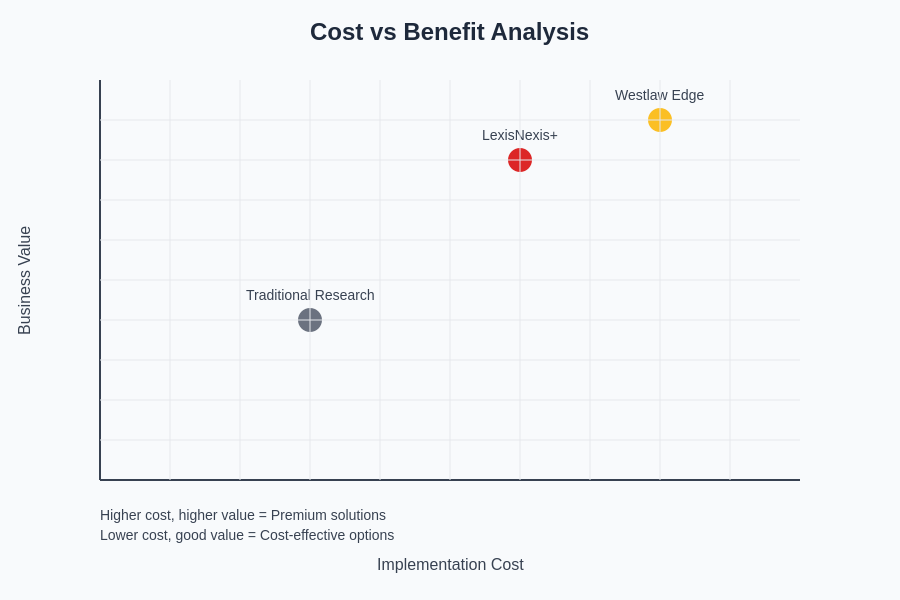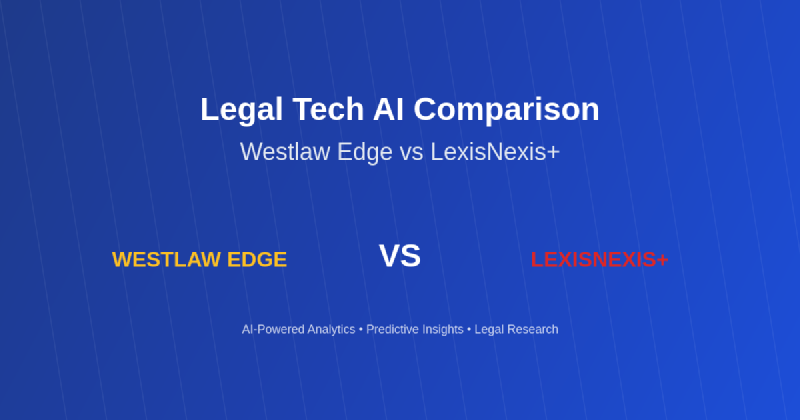The legal profession stands at a pivotal intersection where traditional jurisprudence meets cutting-edge artificial intelligence, fundamentally transforming how legal professionals conduct research, analyze case law, and deliver client services. At the forefront of this technological revolution are two industry titans, Westlaw Edge and LexisNexis+, each offering sophisticated AI-powered analytics platforms that promise to enhance legal research efficiency, improve case outcome predictions, and streamline complex legal workflows. This comprehensive analysis examines the distinctive capabilities, technological approaches, and practical applications of these competing platforms, providing legal professionals with the insights necessary to make informed decisions about their research infrastructure investments.
Stay informed about the latest legal technology trends as AI continues to reshape the practice of law and transform traditional legal research methodologies. The integration of artificial intelligence into legal research platforms represents more than mere technological enhancement; it embodies a fundamental shift toward data-driven legal practice that leverages predictive analytics, natural language processing, and machine learning to augment human legal expertise with unprecedented computational power.
The Evolution of Legal Research Technology
The transformation of legal research from manual case citation searches to AI-powered predictive analytics represents one of the most significant technological advances in the legal profession’s modern history. Traditional legal research required extensive manual review of case law, statutory materials, and secondary sources, consuming countless billable hours while offering limited analytical insights beyond basic citation verification and precedent identification. The introduction of digital databases revolutionized access to legal materials, but the current generation of AI-powered platforms has fundamentally altered the research paradigm by introducing predictive capabilities, automated analysis, and intelligent content discovery that extends far beyond simple keyword matching.
Both Westlaw Edge and LexisNexis+ have invested heavily in artificial intelligence research and development, recognizing that the future of legal practice depends increasingly on platforms that can not only locate relevant legal authorities but also provide meaningful insights about case outcomes, judicial tendencies, and strategic litigation approaches. These platforms represent the culmination of decades of legal technology evolution, incorporating advanced natural language processing, machine learning algorithms, and comprehensive legal databases to create research environments that augment human legal reasoning with computational intelligence.
Westlaw Edge AI Capabilities and Architecture
Thomson Reuters’ Westlaw Edge platform represents a comprehensive approach to AI-powered legal research, built upon the foundation of the world’s most extensive legal database combined with proprietary artificial intelligence technologies designed specifically for legal applications. The platform’s AI architecture centers around West Search Plus, an intelligent search engine that utilizes natural language processing to understand complex legal queries expressed in conversational language, automatically identifying relevant concepts, jurisdictions, and practice areas while suggesting related search terms and alternative query formulations.
The predictive analytics capabilities of Westlaw Edge extend beyond traditional research functions to include judicial analytics that provide detailed insights into individual judges’ decision-making patterns, case disposition tendencies, and ruling histories across specific legal issues. This judicial intelligence feature enables legal professionals to develop more informed litigation strategies by understanding how particular judges have ruled on similar motions, their typical sentencing patterns in criminal cases, and their general judicial philosophy as reflected in their written opinions and procedural rulings.
Explore advanced AI capabilities with Claude for enhanced legal document analysis and comprehensive case research that complements traditional legal research platforms. The integration of multiple AI tools creates a powerful ecosystem for legal professionals seeking to leverage artificial intelligence throughout their practice management and client service delivery processes.
Westlaw Edge’s KeyCite Overruling Risk feature represents a particularly innovative application of artificial intelligence to case law analysis, utilizing machine learning algorithms to assess the likelihood that specific legal holdings may be overruled or significantly modified by future court decisions. This predictive capability enables attorneys to evaluate the long-term viability of their legal arguments and adjust their strategies accordingly, providing clients with more accurate assessments of case strength and potential outcomes.
The platform’s Litigation Analytics module provides comprehensive data analysis capabilities that track case outcomes, motion success rates, and settlement patterns across different courts, practice areas, and opposing counsel, enabling legal professionals to make data-driven decisions about case strategy, settlement negotiations, and resource allocation. These analytics extend to detailed attorney performance metrics, allowing legal professionals to research opposing counsel’s track record, typical case outcomes, and strategic approaches in similar matters.
LexisNexis+ Analytics and Intelligence Framework
LexisNexis+ approaches AI-powered legal research through its Lexis+ AI platform, which integrates artificial intelligence capabilities throughout the research process while maintaining the comprehensive content collection that has established LexisNexis as a leading legal research provider. The platform’s AI architecture emphasizes contextual understanding and intelligent content recommendation, utilizing machine learning algorithms to analyze user research patterns and suggest relevant materials that might not emerge through traditional keyword searches.
The Lexis+ Analytics suite provides sophisticated data analysis tools that track litigation outcomes, judicial behavior patterns, and case disposition statistics across federal and state court systems, enabling legal professionals to develop evidence-based strategies for case management and client counseling. The platform’s predictive modeling capabilities extend to settlement value estimation, motion outcome prediction, and case duration forecasting, providing attorneys with quantitative insights that support strategic decision-making throughout the litigation process.
LexisNexis+ Context feature represents a significant advancement in legal research methodology, automatically identifying and presenting related cases, statutes, regulations, and secondary sources that share factual similarities or legal issues with the user’s current research focus. This contextual intelligence reduces the time required for comprehensive legal research while ensuring that relevant authorities are not overlooked due to variations in legal terminology or citation practices.
The platform’s Legal Analytics module provides detailed insights into law firm performance, attorney track records, and judicial decision-making patterns, enabling legal professionals to benchmark their practice against industry standards and identify opportunities for strategic improvement. These analytics include comprehensive data about case outcomes, motion success rates, and settlement patterns that inform tactical decisions throughout the litigation lifecycle.
Comparative Analysis of AI Search Capabilities
The search capabilities of both platforms demonstrate sophisticated artificial intelligence implementations, though each takes a distinctive approach to query interpretation and result presentation. Westlaw Edge’s West Search Plus excels in natural language query processing, enabling users to formulate complex legal questions in conversational language while receiving highly relevant results that reflect the platform’s deep understanding of legal concepts and terminology. The search algorithm’s ability to identify conceptual relationships between legal issues, even when different terminology is used, represents a significant advancement over traditional boolean search methodologies.
LexisNexis+ emphasizes search result accuracy and relevance through its AI-powered ranking algorithms that consider multiple factors including jurisdictional relevance, case authority level, and factual similarity to the user’s research context. The platform’s search intelligence extends to automatic query expansion and refinement suggestions that help users discover relevant materials that might not be immediately apparent from their initial search terms.
Both platforms incorporate sophisticated filtering and refinement tools that enable users to narrow their search results based on jurisdiction, court level, date ranges, and practice area focus, though they differ in their approach to presenting these options and integrating them with their respective AI capabilities. The effectiveness of each platform’s search functionality often depends on the specific research context and user preferences regarding result presentation and analytical depth.
Predictive Analytics and Outcome Forecasting
The predictive analytics capabilities of both platforms represent perhaps the most transformative aspect of modern legal research technology, enabling attorneys to move beyond traditional precedent analysis to evidence-based outcome prediction and strategic planning. Westlaw Edge’s predictive tools focus heavily on judicial behavior analysis, providing detailed insights into individual judges’ ruling patterns, motion disposition rates, and sentencing tendencies that enable attorneys to tailor their arguments and expectations to specific judicial preferences and procedural approaches.
LexisNexis+ approaches predictive analytics through comprehensive case outcome modeling that considers multiple variables including case type, jurisdiction, attorney involvement, and historical disposition patterns to generate probability assessments for various litigation outcomes. These predictive models extend to settlement value estimation, case duration forecasting, and motion success probability calculation, providing attorneys with quantitative tools for client counseling and case strategy development.
Enhance your research capabilities with Perplexity for comprehensive information gathering that complements legal database research and supports evidence-based decision making in complex legal matters. The integration of multiple analytical tools creates opportunities for more sophisticated legal research and strategy development than any single platform can provide independently.
The accuracy and reliability of predictive analytics depend heavily on the quality and comprehensiveness of underlying data, as well as the sophistication of the machine learning models used to generate predictions. Both platforms continue to refine their predictive capabilities through ongoing data collection and algorithm enhancement, though the practical utility of these predictions varies significantly across different practice areas and case types.

The artificial intelligence capabilities comparison demonstrates the sophisticated technological approaches employed by both platforms, with each showing distinct strengths in different aspects of legal AI implementation, from natural language processing and predictive modeling to judicial analytics and citation intelligence systems.
Document Analysis and Review Automation
Modern legal practice increasingly relies on efficient document analysis and review processes, particularly in litigation contexts involving large document productions and discovery obligations. Westlaw Edge provides AI-powered document review capabilities through its Westlaw Edge Document Analyzer, which can automatically identify key documents, extract relevant information, and categorize materials based on legal relevance and privilege considerations. This automation significantly reduces the time and resources required for document review while improving consistency and accuracy in document analysis processes.
LexisNexis+ offers comprehensive document analysis tools through its AI-powered review platform that can automatically identify potentially privileged materials, extract key factual information, and organize documents based on legal issues and case themes. The platform’s machine learning capabilities enable it to learn from user review decisions and improve its accuracy over time, reducing the manual effort required for large-scale document review projects.
Both platforms integrate their document analysis capabilities with their broader research and analytics tools, enabling users to seamlessly transition from document review to legal research and case strategy development. The effectiveness of these automated review tools depends significantly on proper setup and training, as well as ongoing quality control and human oversight to ensure accuracy and completeness.
Case Law Analysis and Citation Verification
The evolution of citation analysis represents a critical advancement in legal research technology, moving beyond simple citation checking to comprehensive analysis of case authority, precedential value, and potential vulnerabilities in legal arguments. Westlaw Edge’s KeyCite system incorporates AI-enhanced analysis that not only identifies negative treatment of cited cases but also assesses the strength of legal holdings and identifies potential challenges to established precedent based on evolving legal trends and judicial attitudes.
LexisNexis+ provides comprehensive citation analysis through its Shepard’s Citations service, enhanced with AI capabilities that identify not only direct negative treatment but also cases that may undermine the precedential value of cited authorities through factual distinctions, legal evolution, or jurisdictional variations. The platform’s AI algorithms analyze the context and significance of citing references to provide users with deeper insights into the actual impact of negative citations on their legal arguments.
Both platforms have invested significantly in natural language processing capabilities that can identify implicit criticism or limitation of legal precedent even when cases are not explicitly overruled or reversed, providing attorneys with more nuanced understanding of case authority and precedential strength than traditional citation analysis methods could provide.

The comprehensive feature analysis reveals distinct strengths and positioning strategies for each platform, with Westlaw Edge demonstrating particular excellence in judicial analytics and database coverage, while LexisNexis+ offers competitive advantages in cost effectiveness and comprehensive legal research capabilities across multiple practice areas.
Cost-Benefit Analysis and Implementation Considerations
The financial implications of implementing comprehensive AI-powered legal research platforms extend beyond simple subscription costs to encompass training requirements, workflow integration, and potential productivity improvements that may justify significant technology investments. Westlaw Edge typically commands premium pricing due to its extensive database coverage and sophisticated AI capabilities, though the platform’s efficiency improvements and analytical insights may generate substantial returns on investment through reduced research time and improved case outcomes.
LexisNexis+ generally offers competitive pricing structures with flexible subscription options that can accommodate different firm sizes and usage patterns, though the total cost of ownership includes consideration of training requirements, system integration costs, and ongoing support needs. The platform’s comprehensive analytics and research capabilities may provide particular value for litigation-focused practices that can leverage predictive insights for strategic advantage.
Both platforms require significant training investments to maximize their AI capabilities and ensure that legal professionals can effectively utilize advanced features for optimal research efficiency and analytical insight. The learning curve associated with advanced AI features may initially reduce productivity, though properly trained users typically experience substantial long-term efficiency gains that justify the initial investment in platform adoption and training.

The cost-benefit analysis illustrates the strategic positioning of each platform within the legal technology marketplace, demonstrating how implementation costs correlate with business value delivery and helping legal professionals make informed decisions about technology investments based on their specific practice requirements and budget considerations.
Integration with Legal Practice Management
Modern legal practice increasingly requires seamless integration between research platforms and broader practice management systems, case management software, and client communication tools. Westlaw Edge provides comprehensive integration capabilities with leading practice management platforms, enabling users to seamlessly transfer research results, case citations, and analytical insights into client matters and billing systems while maintaining detailed records of research activities for client reporting and internal efficiency analysis.
LexisNexis+ offers extensive integration options with popular legal software platforms, allowing users to incorporate research results and analytical insights directly into document drafting, case management, and client communication workflows. The platform’s API capabilities enable custom integrations for firms with specialized software requirements or unique workflow needs that require tailored connectivity solutions.
The effectiveness of platform integration depends significantly on the specific software ecosystem used by individual law firms, as well as their willingness to invest in custom integration development and ongoing system maintenance. Both platforms provide professional services support for complex integration projects, though the cost and complexity of these implementations vary significantly based on firm requirements and existing technology infrastructure.
User Experience and Interface Design
The user experience design of legal research platforms significantly impacts research efficiency and user adoption, particularly as platforms incorporate increasingly sophisticated AI capabilities that must remain accessible to users with varying levels of technical expertise. Westlaw Edge emphasizes intuitive interface design that presents AI-powered features and analytical insights within familiar research workflows, reducing the learning curve associated with advanced capabilities while maintaining the comprehensive functionality that legal professionals require.
LexisNexis+ focuses on streamlined user experience design that integrates AI capabilities seamlessly throughout the research process, providing intelligent suggestions and automated analysis without overwhelming users with technical complexity or requiring extensive training for basic functionality. The platform’s interface design emphasizes quick access to critical information while providing detailed analytical capabilities for users who require comprehensive data analysis and strategic insights.
Both platforms continue to evolve their user experience design based on user feedback and usage analytics, incorporating improvements that enhance research efficiency while maintaining the reliability and comprehensiveness that legal professionals require for their practice obligations and client service delivery.
Future Developments and Technological Roadmaps
The competitive landscape of AI-powered legal research continues to evolve rapidly as both platforms invest heavily in artificial intelligence research, natural language processing advancement, and predictive analytics enhancement. Westlaw Edge’s development roadmap emphasizes expanded predictive capabilities, enhanced judicial analytics, and improved integration with emerging legal technology tools including contract analysis platforms, e-discovery systems, and automated document generation tools.
LexisNexis+ focuses its development efforts on comprehensive AI integration throughout the legal research process, enhanced predictive modeling capabilities, and expanded analytics offerings that provide deeper insights into litigation strategy, case valuation, and outcome prediction. The platform’s technological roadmap includes significant investments in machine learning advancement and natural language processing improvement that promise to further enhance research accuracy and analytical depth.
Both platforms recognize that the future of legal research depends increasingly on artificial intelligence capabilities that can augment human legal reasoning with computational insights, predictive analytics, and automated analysis tools that enhance both research efficiency and strategic decision-making capabilities throughout the practice of law.
Industry Impact and Professional Transformation
The widespread adoption of AI-powered legal research platforms represents a fundamental transformation in legal practice methodology, shifting the profession toward more data-driven decision making and evidence-based strategy development. This technological evolution requires legal professionals to develop new skills in data interpretation, analytical reasoning, and AI tool utilization while maintaining traditional legal expertise in case analysis, statutory interpretation, and client counseling.
The competitive advantages gained through effective utilization of AI-powered research tools are becoming increasingly significant in legal practice, as firms that can leverage predictive analytics, comprehensive case outcome data, and intelligent research capabilities can provide clients with more accurate case assessments, strategic insights, and cost-effective legal services than competitors relying solely on traditional research methodologies.
The democratization of sophisticated legal research capabilities through AI-powered platforms also has implications for legal education, continuing professional development, and the broader accessibility of legal services, as these tools enable smaller firms and solo practitioners to access analytical capabilities that were previously available only to large law firms with extensive research departments and substantial technology budgets.
Conclusion and Strategic Recommendations
The choice between Westlaw Edge and LexisNexis+ ultimately depends on specific practice requirements, technological preferences, budget considerations, and strategic priorities that vary significantly across different legal practice contexts. Both platforms offer sophisticated AI capabilities that can substantially enhance research efficiency, improve analytical depth, and provide competitive advantages through predictive insights and comprehensive case outcome data.
Legal professionals considering platform adoption should carefully evaluate their specific research needs, existing technology infrastructure, training requirements, and long-term strategic objectives to determine which platform best aligns with their practice goals and client service commitments. The investment in AI-powered legal research capabilities represents a significant opportunity to enhance legal practice effectiveness while positioning firms for success in an increasingly competitive and technology-driven legal marketplace.
The continued evolution of artificial intelligence in legal research promises even more sophisticated capabilities in the coming years, making platform selection decisions that account for future technological development and adaptability increasingly important for legal professionals seeking to maintain competitive advantages and provide exceptional client service in a rapidly changing legal technology landscape.
Disclaimer
This article is for informational purposes only and does not constitute professional or legal advice. The views expressed are based on current understanding of legal technology platforms and their capabilities. Legal professionals should conduct their own evaluation and consider their specific requirements when selecting research platforms. Platform features, pricing, and capabilities may vary and are subject to change. Readers should verify current platform specifications and consult with technology providers before making implementation decisions.
